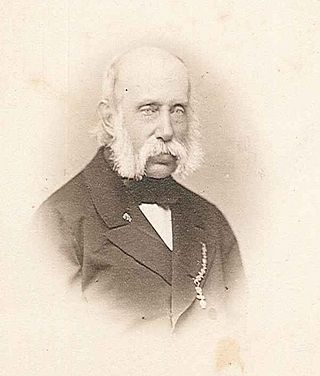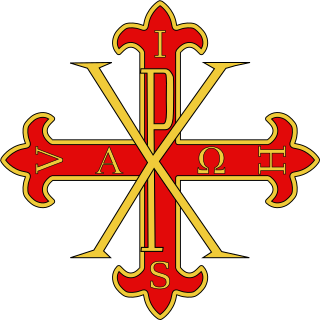
Ferdinand II was King of the Two Sicilies from 1830 until his death in 1859.

Archduke Franz Karl Joseph of Austria was a member of the House of Habsburg-Lorraine. He was the father of two emperors: Franz Joseph I of Austria and Maximilian I of Mexico. Through his third son Karl Ludwig, he was the grandfather of Archduke Franz Ferdinand of Austria – whose assassination sparked the hostilities that led to the outbreak of World War I – and the great-grandfather of the last Habsburg emperor Karl I.
Knights of St. George may refer to:
A dynastic order, monarchical order, or house order is an order under royal patronage. Such an order is bestowed by, as a legitimate fons honorum, a sovereign or the head of a once-sovereign ruling family. These are often considered part of the cultural patrimony of the ruling family. Dynastic orders were often founded or maintained to reward service to a monarch or their subsequent dynasty.

An order of chivalry, order of knighthood, chivalric order, or equestrian order is an order of knights, typically founded during or inspired by the original Catholic military orders of the Crusades and paired with medieval concepts of ideals of chivalry.

The Illustrious Royal Order of Saint Januarius is a Roman Catholic order of knighthood founded by Charles VII of Naples in 1738. It was the last great dynastic order to be constituted as a chivalric fraternity, with a limitation to Roman Catholics and a direct attachment to the dynasty rather than the state. The founder of the order, Charles VII of Naples, ruled from 1734 until 1759.

The Royal Order of Francis I was an extinct order of merit of the former Kingdom of the Two Sicilies which was annexed in 1861 by the King of Italy. It has been revived by Prince Carlo, Duke of Castro, as an award for services to charity and inter-religious understanding and includes a number of non-Roman Catholic statesmen and stateswomen among its membership.

Jean-Christophe, Prince Napoléon, Prince of Montfort is the disputed head of the Imperial House of France, and as such the heir of Napoleon Bonaparte, the first Emperor of the French. He would be known as Napoleon VII.

Prince Ferdinand Pius, Duke of Calabria and Castro, was head of the House of Bourbon-Two Sicilies and pretender to the throne of the extinct Kingdom of the Two Sicilies from 1934 to 1960.

Prince Ranieri Maria Gaetano, Duke of Castro was a claimant to the headship of the House of Bourbon-Two Sicilies.
Prince Ferdinand of Bourbon-Two Sicilies, Duke of Castro was a claimant to the headship of the former Royal House of the Two Sicilies.

The Sacred Military Constantinian Order of Saint George, also historically referred to as the Imperial Constantinian Order of Saint George and the Order of the Constantinian Angelic Knights of Saint George, is a dynastic order of knighthood of the House of Bourbon-Two Sicilies. Currently, the grand magistry of the order is disputed among the two claimants to the headship of the formerly reigning House of Bourbon-Two Sicilies as heirs of the House of Farnese, namely Prince Pedro and Prince Carlo. The order was one of the rare orders confirmed as a religious-military order in the papal bull Militantis Ecclesiae in 1718, owing to a notable success in liberating Christians in the Peloponnese. Together with the Sovereign Military Order of Malta, it is one of a small number of Catholic orders that still have this status today. It is not an order of chivalry under the patronage of the Holy See, but its membership is restricted to practising Catholics.

Prince Carlo of Bourbon-Two Sicilies, Duke of Castro is one of the two claimants to the headship of the former House of Bourbon-Two Sicilies.

The Order of Saint George of the Reunion is an order of knighthood of the Kingdom of the Two Sicilies. It was established to replace the Royal Order of the Two-Sicilies.

The Illustrious Royal Order of Saint Ferdinand and Merit is an order of knighthood of the Kingdom of the Two Sicilies.

Leopoldo Giovanni Giuseppe Michele of Bourbon-Two Sicilies, Prince of Salerno was a member of the House of Bourbon-Two Sicilies and a Prince of Bourbon-Two Sicilies. He married Archduchess Clementina of Austria in 1816, and became the Prince of Salerno.

Prince Pedro of Bourbon-Two Sicilies, Duke of Calabria, Grandee of Spain, is the only son of Infante Carlos, Duke of Calabria (1938–2015), and his wife, Princess Anne of Orléans. As primogeniture heir of the kings of the Two Sicilies he is the principal claimant to the headship of the Royal House of Bourbon-Two Sicilies, which ruled the Kingdom of the Two Sicilies before the unification of Italy.

Princess Béatrice Marie Caroline Louise Françoise of Bourbon-Two Sicilies is the eldest daughter of Prince Ferdinand, Duke of Castro, Castro-line claimant to the headship of the House of Bourbon-Two Sicilies, and his wife, Chantal de Chevron-Villette.

The Italian honours system is a means to reward achievements or service to the Italian Republic, formerly the Kingdom of Italy, including the Italian Social Republic.
This page is based on this
Wikipedia article Text is available under the
CC BY-SA 4.0 license; additional terms may apply.
Images, videos and audio are available under their respective licenses.
 Sacred Military Constantinian Order of Saint George, a Catholic order of chivalry founded around 1545 by the Angelo Flavio Comneno family and currently awarded by the House of Bourbon-Two Sicilies
Sacred Military Constantinian Order of Saint George, a Catholic order of chivalry founded around 1545 by the Angelo Flavio Comneno family and currently awarded by the House of Bourbon-Two Sicilies  Royal Order of Saint George for the Defense of the Immaculate Conception, a chivalric order of the Kingdom of Bavaria founded in 1726 by Elector Maximilian II Emanuel and currently awarded by the House of Wittelsbach
Royal Order of Saint George for the Defense of the Immaculate Conception, a chivalric order of the Kingdom of Bavaria founded in 1726 by Elector Maximilian II Emanuel and currently awarded by the House of Wittelsbach Ancient Order of Saint George, a Christian order of chivalry founded in 1768 by Count Philipp Ferdinand of Limburg-Stirum, which was revived in 1926
Ancient Order of Saint George, a Christian order of chivalry founded in 1768 by Count Philipp Ferdinand of Limburg-Stirum, which was revived in 1926 Order of Saint George of the Reunion, a chivalric order of the Kingdom of the Two Sicilies founded in 1819 by King Ferdinand I and currently awarded by the Duke of Castro's branch of the House of Bourbon-Two Sicilies
Order of Saint George of the Reunion, a chivalric order of the Kingdom of the Two Sicilies founded in 1819 by King Ferdinand I and currently awarded by the Duke of Castro's branch of the House of Bourbon-Two Sicilies Order of Saint George (Hanover), a chivalric order of the Kingdom of Hanover founded in 1839 by King Ernest Augustus and currently awarded by the House of Hanover
Order of Saint George (Hanover), a chivalric order of the Kingdom of Hanover founded in 1839 by King Ernest Augustus and currently awarded by the House of Hanover Order of Saint George (Habsburg-Lorraine), a dynastic order of chivalry founded in 2008 by the House of Habsburg-Lorraine
Order of Saint George (Habsburg-Lorraine), a dynastic order of chivalry founded in 2008 by the House of Habsburg-Lorraine Order of St Michael and St George, a chivalric order of the United Kingdom founded in 1818 by George, Prince Regent (later King George IV)
Order of St Michael and St George, a chivalric order of the United Kingdom founded in 1818 by George, Prince Regent (later King George IV) Order of Saints George and Constantine, a chivalric order of the Kingdom of Greece founded in 1936 by King George II and currently awarded by the Greek Royal Family
Order of Saints George and Constantine, a chivalric order of the Kingdom of Greece founded in 1936 by King George II and currently awarded by the Greek Royal Family













